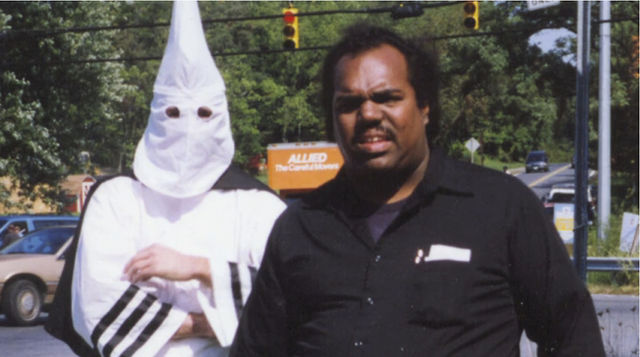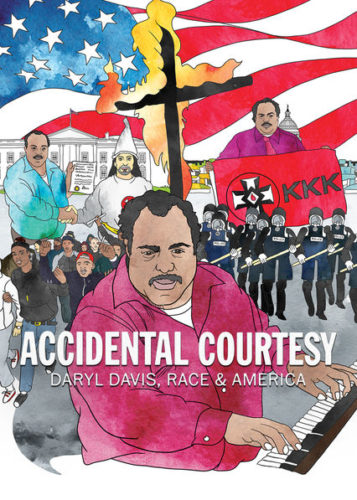
Last week’s lectionary reading from Paul’s second letter to the Corinthians couldn’t help but remind me of Daryl Davis’ stunning talk at last year’s DC Conference.
 Davis, who lives right up the road from me in Silver Spring, Maryland, is a gifted rock-and-roll pianist who has played with the likes of Little Richard and Chuck Berry. What’s more interesting, though, is what Daryl does with his life when he’s not playing the piano. You can see this for yourself in a documentary called “Accidental Courtesy,” which is available on Netflix. As you may recall, for an African American man, Daryl has a most unusual pastime. He has spent the last thirty or so years of his life befriending high-ranking members of the Ku Klux Klan.
Davis, who lives right up the road from me in Silver Spring, Maryland, is a gifted rock-and-roll pianist who has played with the likes of Little Richard and Chuck Berry. What’s more interesting, though, is what Daryl does with his life when he’s not playing the piano. You can see this for yourself in a documentary called “Accidental Courtesy,” which is available on Netflix. As you may recall, for an African American man, Daryl has a most unusual pastime. He has spent the last thirty or so years of his life befriending high-ranking members of the Ku Klux Klan.
In the film, Daryl tells the story of how this started and why. One night, in a club where he was playing, a member of the Klan struck up a conversation with him. He wasn’t sure how to take it at first. He had never met a white person willing to say he was a Klansman. And Daryl was, for this Klansman, the only black person he had ever talked to. Daryl began to think, “How can you hate me, when you don’t even know me?”
So Daryl decided the way to handle this situation was to be the Klansman’s friend and to see if, by their interaction together, this Klansman might change his mind regarding his group’s hateful ideology. Daryl would call his friend and say, for example, “I’m headed to Lowes, you want to go with me?”
He would just come up with reasons for them to be together. As time progressed and their friendship grew, the Klansman friend rose in the ranks of Klansmanship, eventually becoming the Imperial Wizard, which is the national leader of the Klan. But Daryl was always there for him, never judged him, never turned to rhetoric to tell him he was wrong. Daryl just loved him, loved him the way we who know Christ are called to love one another, to love as he has loved us.
And the result? Daryl Davis will proudly show you his friend’s Klan robes, which his friend gave him the day he made the decision to leave the Klan, all because of his friendship with Daryl. Daryl loved that man, waited patiently for him, until the day that man was able to put two and two together and saw the light. And that was a happy day for Daryl, I’m sure, but Daryl didn’t stop there. Today, Daryl Davis has a collection of Klan robes, given to him by the multitude of Klansmen with whom he became friends. Rather than staying in his own circles of self-affirmation, Daryl reached out with an open heart.

As novel as the documentary presents it, Davis’ approach is nothing new. In Second Corinthians, Paul links our need for reconciliation to the ministry of Jesus Christ. At the end of the fifth chapter, he says:
All this is from God, who reconciled us to himself through Christ, and has given us the ministry of reconciliation; that is, in Christ God was reconciling the world to himself, not counting their trespasses against them, and entrusting the message of reconciliation to us. So we are ambassadors for Christ, since God is making his appeal through us; we entreat you on behalf of Christ, be reconciled to God. For our sake he made him to be sin who knew no sin, so that in him we might become the righteousness of God.
After saying that, to use sales lingo, Paul makes the ‘Big Ask.’ He tells the Corinthians (and I’m paraphrasing),
Our heart is wide open to you; open wide your hearts also.
That’s what reconciliation looks like, and that’s what it means to reconcile the world.
And that’s what Paul’s second letter to the Corinthians is all about. It’s about mutual open-heartedness. The letter is plain speech about being committed to reconciliation with one another. In fact, really, the Gospel itself is a story of reconciliation. That’s a word we throw around a lot, especially in the social justice realm, but what’s at stake in this reconciliation that Paul has in mind is not just between he and his audience, more so, what’s at stake is God, and God’s act of reconciliation—that at the very heart of God we find this reconciliation: open-heartedness toward those who are estranged from Him.
What a concept, and what a thing that we could truly use in the today’s world, a world in which most of us believe that we are now more polarized than ever. We have more ways than ever to connect with people, but what we’re actually doing with the technology is making us more disconnected than any generation that has ever walked the planet. And I’m not just talking about all of the recent conversation about the dangers of our excessive engagement with social media, our constant navel gazing through our screens—that you can now sit in a coffee shop, surrounded by others, and watch how everyone sits, glued to their screens, with absolutely no human interaction whatsoever.
More than that, we tend to live our lives today in echo chambers of self-affirmation. That’s true of our circle of Facebook friends, it’s true of the organizations we decide to join, it’s true of the company we keep. And the problem with this, is that reconciliation doesn’t mean being friendly with people who look and act and talk and think exactly the way we do. Reconciliation means bringing people together who were otherwise previously far off from each other, just like God reconciling the world to himself through Christ. It involves looking beyond both our own screens and our own belly buttons. And it involves looking beyond our personal circles of self-affirmation, whatever those circles may be.
Paul calls the Corinithians to engage this world with the same open-heartedness and love. He reminds his readers that, in love’s service, there can be only one foxhole, and that there’s no room for sitting in our own little bunkers of self-affirmation, lobbing word grenades at each other. Instead, by the power of the Spirit, our hearts are opened to this bitterly divided world, pointing to God’s reconciling love. Of course we will fail (and fail again), but even when we fail, the ultimate reconciliation of the world is God’s work through Christ, who, having loved his own who were in the world, loved them to the very end.
Daryl Davis: Grace, Race, and the KKK from Mockingbird on Vimeo.

COMMENTS
2 responses to “Opening Our Hearts: Daryl Davis and Reconciliation”
Leave a Reply













Wonderful thing Daryl did, and his Christian self-emptying is greatly to be commended and emulated wherever possible. No doubt God was involved in it, and you can see the movement of grace in a miraculous way.
But God was also involved in making Daryl a big man, obviously strong and not to be trifled with. Anybody who doesn’t think that made and makes a difference for the success of his ministry would be wrong — a person of slighter physical stature and bulk would need to be more careful about their personal safety with a Klansman than Daryl did, perhaps by a significant margin. Fare forward carefully.